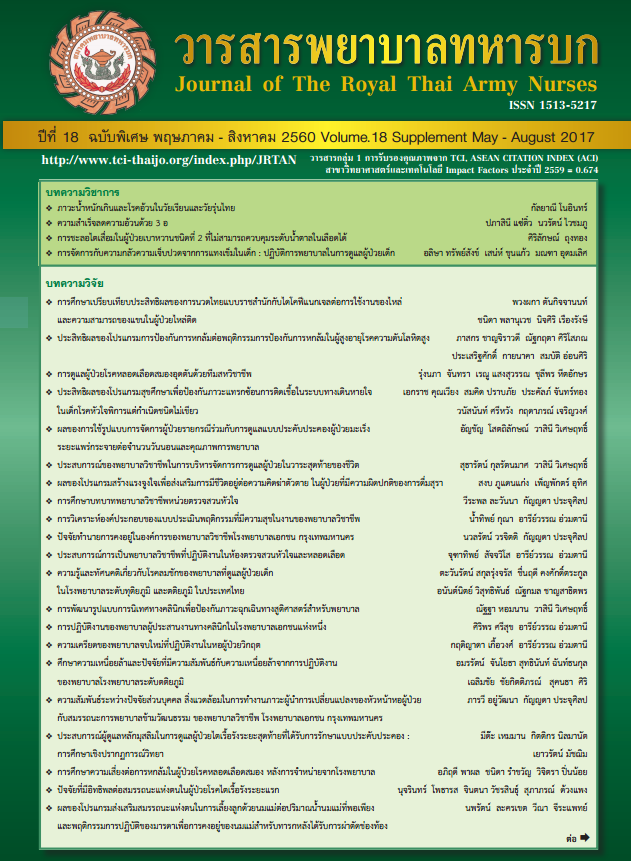ประสบการณ์ของพยาบาลวิชาชีพในการบริหารจัดการ การดูแลผู้ป่วยในวาระสุดท้ายของชีวิต
Keywords:
การจัดการการดูแล, ผู้ป่วยในวาระสุดท้ายของชีวิต, พยาบาลวิชาชีพ, Care Management, End of Life Patients, Profession NursesAbstract
การศึกษาครั้งนี้ มีวัตถุประสงค์เพื่อบรรยายความหมายและประสบการณ์ของพยาบาลวิชาชีพในการบริหารจัดการการดูแลผู้ป่วยในวาระสุดท้ายของชีวิต โดยใช้วิธีการวิจัยคุณภาพเชิงปรากฏการณ์วิทยาแบบตีความ ผู้ให้ข้อมูลในการศึกษาวิจัย คือพยาบาลวิชาชีพที่มีประสบการณ์ตรงในการบริหารจัดการการดูแลผู้ป่วยในวาระสุดท้ายของชีวิตในโรงพยาบาลศิริราช ปฏิบัติหน้าที่เป็นหัวหน้าเวร ผ่านการอบรมเกี่ยวกับการดูแลแบบประคับประคอง และมีระยะเวลาในการปฏิบัติงานตั้งแต่ 10 ปีขึ้นไป จำนวน 13 คน เก็บรวบรวมข้อมูลโดยใช้การสัมภาษณ์แบบเจาะลึกและการบันทึกเทปสนทนา นำข้อมูลที่ได้มาถอดเทปแบบคำต่อคำและวิเคราะห์ข้อมูลเชิงเนื้อหาตามวิธีการของ แวน มาเนนผลการศึกษาพบว่าพยาบาลวิชาชีพให้ความหมายของการบริหารจัดการการดูแลผู้ป่วยในวาระสุดท้ายของชีวิตตามที่รับรู้และตีความตามความคิดและประสบการณ์ที่ผ่านมาของตนได้ว่า เป็นการทำความเข้าใจถึงแนวคิดหลักการดูแลแบบประคับประคองด้วยการใช้ความรู้คู่ทักษะและประสบการณ์ การเรียนรู้จากประสบการณ์ และการได้รับการอบรม ร่วมกับการจัดการด้วยใจ ใส่ใจทำให้ดีที่สุด เหมือนญาติผู้ใกล้ชิด ส่วนประสบการณ์ของพยาบาลวิชาชีพในการบริหารจัดการการดูแลผู้ป่วยในวาระสุดท้ายของชีวิตพบ 3 ประเด็นหลัก ดังนี้ 1. การจัดการเพื่อการตายดี 2. การจัดการกับอารมณ์ความรู้สึกของตนเอง ผู้ป่วย ครอบครัวและทีมผู้ดูแลเมื่อต้องเผชิญกับความตาย และ 3. การจัดการปัญหา/อุปสรรคในการดูแลผู้ป่วยในวาระสุดท้ายของชีวิตข้อมูลที่ได้ในครั้งนี้สะท้อนให้เห็นถึงหลักคิด ความรู้สึกและประสบการณ์ของพยาบาลวิชาชีพในการบริหารจัดการดูแลผู้ป่วยในวาระสุดท้ายของชีวิต สามารถนำไปเป็นข้อมูลพื้นฐานให้ผู้บริหารนำไปใช้ในการพัฒนาและส่งเสริมแนวทางการจัดการดูแลผู้ป่วยในวาระสุดท้ายของชีวิตของพยาบาลวิชาชีพให้มีคุณภาพเพิ่มขึ้น
Experiences of Nurses in Care Management of End of Life Patients
The present study was aimed at describing the meanings and experiences of professional nurses in care management for end-of-life patients at Siriraj Hospital using a qualitative hermeneutic phenomenology research methodology. Data providers in the study were composed of 13 professional nurses with experience in care management for end-of-life patients who worked as shift supervisors and received training in palliative care in addition to having work experience of ten years and up. The subjects were selected by purposeful and snowball sampling. Data were collected by using in-depth interview forms and conversation audio recordings. The data obtained were transcribed verbatim and data content analysis was performed based on Van Manen’s method (1990). According to the findings, professional nurses define care management for end-of-life patients based on perception and interpreted care management in line with past ideas and experiences to build understanding about palliative care concepts and principles by using knowledge with skills and learning from experience and training with management by paying attention and doing the best for patients like close relatives. The experiences of professional nurses in care management for end-of-life patients were found to include the following three main issues: 1. management for positive death experiences 2. management of the feelings of personnel, patients, families and healthcare providers when confronted with death 3. management of problems/obstacles in caring for end-of-life patients. The data obtained from this study reflected the principles, feelings and experiences of professional nurses in care management for end-of-life patients. Furthermore, the data can be used as a baseline for managers to develop and promote nursing practice guidelines for end-of-life patient care with improved quality.
Downloads
Downloads
How to Cite
Issue
Section
License
บทความหรือข้อคิดเห็นใดใดที่ปรากฏในวารสารพยาบาลทหารบกเป็นวรรณกรรมของผู้เขียน ซึ่งบรรณาธิการหรือสมาคมพยาบาลทหารบก ไม่จำเป็นต้องเห็นด้วย
บทความที่ได้รับการตีพิมพ์เป็นลิขสิทธิ์ของวารสารพยาบาลทหารบก
The ideas and opinions expressed in the Journal of The Royal Thai Army Nurses are those of the authors and not necessarily those
of the editor or Royal Thai Army Nurses Association.






